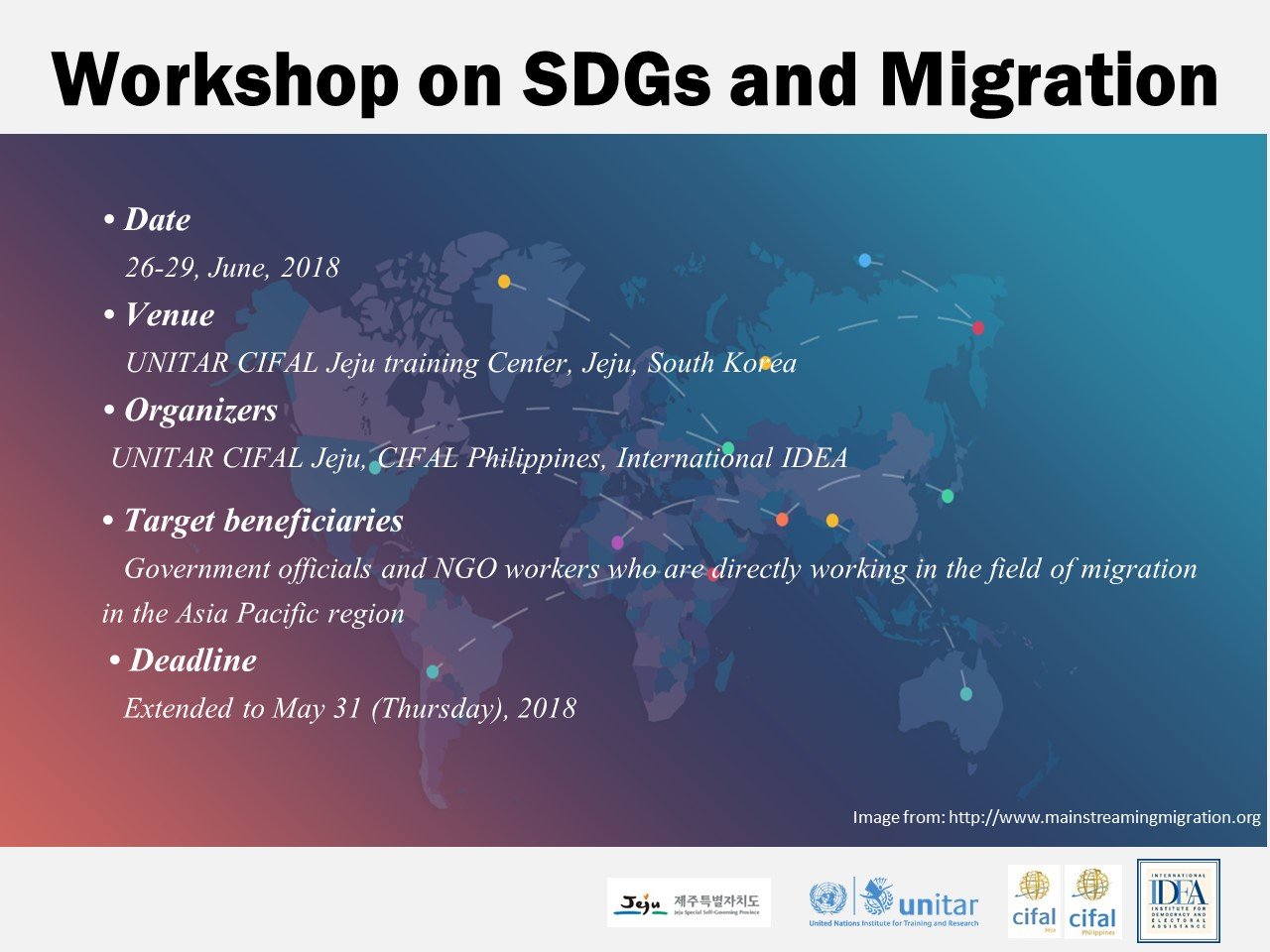Concept+note_2018.HT_WS_June+26-29_website
26-29 June 2018 (Jeju, Korea)
Background
Over the past few decades, globalization and technological advancements have significantly boosted human mobility. As of 2017, UN DESA estimates that 258 million people – 3.3 percent of the global population – are international migrants. While the proportion of migrants to those who remain in their country of birth is relatively small, the total number of people who cross international borders to live, work, study or seek refuge has grown by 49 percent since 2000, and experts predict that migrant flows will continue to increase in the years to come.
Migration has thus become a major issue on the international agenda. In September 2016, the UN General Assembly convened to develop a comprehensive approach to matters involving migrants and refugees – a first in the forum’s history, underscoring the growing importance of international cooperation on migration governance. All 193 UN member states signed the New York Declaration for Refugees and Migrants, signifying global solidarity and commitment to addressing all aspects of international migration, including humanitarian, development and human rights issues.
The UN is now developing a Global Compact for Migration to facilitate safe, orderly and regular diaspora and protect the human rights of migrants. However, since the signing of the New York Declaration, negotiations on the agreement have faced several challenges, including the withdrawal of the United States in December 2017. US Ambassador to the UN Nikki Haley said the declaration is “not compatible with US sovereignty,” and that the country’s “decisions on immigration policies must always be made by Americans and Americans alone.”
This withdrawal from a landmark international agreement illustrates the tensions brought about by migration, especially in policy areas that represent core components of state and sovereignty. Migration governance has become a balancing act of protecting migrants’ rights while also protecting borders. According to International IDEA’s Global State of Democracy, large migration flows strain democratic institutions’ capacity to effectively integrate migrants into society, and call into question the extent to which governments can and should enable migrants’ political participation. Migration also affects democratic institutions and processes in migrants’ countries of origin as citizens abroad seek to influence policies at home.
The figures and political and social developments are impetus for CIFAL Philippines, CIFAL Jeju and the International Institute for Democracy and Electoral Assistance (International IDEA) to jointly convene a workshop on the nexus of migration and democracy, specifically, the challenges to protecting migrants’ rights.
Content and structure
The workshop contents are composed of the following:
● Session 1: Migration data for sustainable development
● Session 2 [Jeju forum]: Implementation of safe, orderly, and regular migration (SDGs. Target 10.7) in the region
● Session 3: Civil rights with gender component focus on marriage migrants and children of interracial relationships
● Session 4: Political rights focus on political participation and voting rights
● Session 5: Economic rights focus on labor migrants and social protection mechanisms
● Session 6: Prevention and combatting human trafficking in persons
● Session 7: Empowerment of migrants and societies to realize full inclusion and social cohesion
● Session 8: International Cooperation for migrants
● Session 9: CityShare
Methodology
The training will be comprised of:
● lectures and presentations by experts
● practical exercises and group discussion
● UNITAR CityShare Methodology
● action plan presentation
● study visit
Target audience
This training is open to local government officials and other related personnel from civil society organizations and institutions who directly work in the field of migration in the Asia Pacific countries.
Event detail
| ∙ Event type | workshop |
| ∙ Date | 26-29 June 2018 |
| ∙ Venue | UNITAR CIFAL Jeju, Jeju, Korea |
| ∙ Organizers | UNITAR CIFAL Jeju/JITC and UNITAR CIFAL Philippines |
| ∙ Certificate | UNITAR, UNITAR CIFAL Jeju/JITC and CIFAL Philippines will jointly issue a certificate upon completion of the training |
Application and deadline
Send the following documents to [email protected] by 31 May 2018 (Thursday):
| 1. Application form | Download from http://www.cifaljeju.org/
|
| 2. Letter of nomination | |
| 3. Letter of commitment | |
| 4. Acknowledgement, waiver and release of liability | |
| 5. Consent to collection, usage, and disclosure of personal info | |
| 6. Case study description (in word file) | |
| 7. Curriculum vitae (CV) | Your own format |
Assistance with travel expenses
- UNITAR CIFAL Jeju/JITC provides a LIMITED financial assistance with the airfareto Jeju-do, Republic of Korea.
| Point of departure |
Airfare Assistance Limit |
|
| Eastern Asia | China, Hong Kong, Macao, Japan and Taiwan | US$ 300 |
| Mongolia | US$ 550 | |
| South-Eastern Asia | Brunei Darussalam, Indonesia, Malaysia, Philippines, Singapore, Thailand, and Vietnam | US$ 450 |
| Cambodia, Lao PDR and Myanmar | US$ 650 | |
| Southern Asia | Afghanistan, Bhutan, India, Maldives and Pakistan | US$ 800 |
| Sri Lanka | US$ 800 | |
| Bangladesh | US$ 850 | |
| Nepal | US$ 950 | |
| Pacific Islands | Kiribati, Papua New Guinea, Samoa, Tuvalu and Vanuatu | US$ 1,200 |
| * Other points of departure – please contact UNITAR CIFAL Jeju/JITC | ||
· Local expenses (transportation, accommodation and meals) during the workshop will be covered by UNITAR CIFAL Jeju/JITC except for arrival and departure days.
· All other expenses (local transportation in their country, visa fee) should be covered by the participants.

![[RIGHT]unitar_logo](https://cifal.up.edu.ph/wp-content/uploads/2024/01/RIGHTunitar_logo.png)
